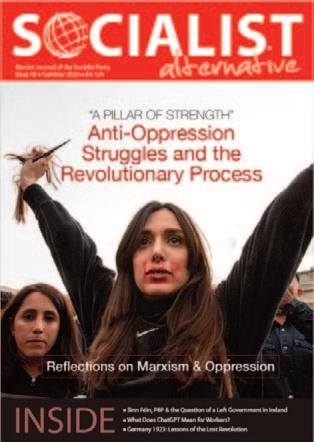
6 minute read
Socialism 101 series #14
By Conor Payne
NETFLIX’S NEW documentary Eldorado: Everything the Nazis Hate shows us a moment in time when, during Germany’s Weimar Republic (1918-1933), there was an opening up of some freedoms for queer people, which allowed many to live more openly than was the case almost anywhere else on Earth. This increased freedom existed alongside the simultaneous rise of the Nazis, whose accession to power brought it to an abrupt and brutal end – culminating in the genocide of queer people in the Holocaust.
Contradictions of Weimar Germany
The film documents the lives of some of those who frequented the Eldorado, one of many queer venues in Berlin at the time. What existed in the Weimar Republic was no liberation but an uneasy toleration. The law against male homosexuality, Paragraph 175, remained on the books, but courts demanded prohibitive levels of evidence to enforce. At the same time, police maintained “pink lists” of known queer people, which would later be used under the Nazi regime.
Trans people were issued medical passes by Magnus Hirschfeld’s Institute for Sexual Science, which allowed them to exist in public without harassment from the police. Crucially, however, this legal toleration was used by LGBTQ+ people to create a flourishing queer life, especially in Berlin. A key part of this was
Hirschfeld’s institute which pioneered sexual and reproductive healthcare and education and affirmed its LGBTQ+ patients. The end of official censorship allowed the development of a queer press, including specific publications for gay men, lesbians and trans people.
All this existed alongside its opposite, the rapidly rising Nazi movement. This contradiction is explored in the figure of Ernst Röhm, a leading Nazi who headed the paramilitary wing of the Nazis, the SA. This mass organisation of millions played an important role in fascism coming to power. Röhm was widely known to be gay and made little attempt to hide the fact. The hyper-masculine culture of this all-male fascist street fighting organisation, which was used to carry out terror against Jews, the workers’ movement and the left, ironically facilitated the toleration of homosexuality among some of its leading figures.
This documentary is a fascinating insight into the lives of queer people who experienced both (at the time) unprecedented freedom followed quickly by unprecedented repression. While we are not experiencing anything equivalent to the coming to power of the Nazis, the film nonetheless is eerily resonant with the current right-wing backlash against LGBTQ+ rights.
Incomplete picture but important warning
Eldorado gives too limited a picture to really explain how such rapid changes in the fortunes of queer people could
Marxist journal of the Socialist Party:
Socialist Alternative no.18
Includes articles on: l 25 years on: Has the Good Friday Agreement delivered? l Sinn Féin, PBP & the question of a left government l Anti-oppression struggles & the revolutionary process l What does ChatGPT mean for workers? l 75 years since the founding of the NHS l Germany 1923: Lessons of the lost revolution l Reviews of The Myth of Normal, Close To Home and The Patriarchs: The Origins of Inequality


€4 / £4
Get a copy from any Socialist Party member or order online or subscribe at: socialistparty.ie or socialistpartyni.org occur. It suggests that a mass of ordinary Germans outside the big cities were uncomfortable with the pace of change. While no doubt many people retained conservative views on these issues, throughout this period, the increased freedom of the Weimar period didn’t fall from the sky. It’s difficult to imagine it happening without the German revolution, which ended World War I and the German empire, which was dominated by an ultra-conservative and militaristic ruling elite.
This revolution, which isn’t mentioned in the film, was driven precisely by the mass of ordinary, working-class people in Germany. It threatened to bring down the whole capitalist social order.
The Weimar Republic was led not by revolutionaries but by those who had betrayed and crushed this revolution and saved capitalism in Germany, including the leadership of the Social Democratic Party. However, it was still forced to reflect in some ways the pressure of this powerful workers’ movement – including by the end of censorship, increased legal rights for women etc. This changed atmosphere was the context that allowed queer people to push through and create their own spaces where they could exist openly.
For analysis of LGBTQphobia, fascism, or the struggle for queer liberation, we should look elsewhere. Yet Eldorado remains an important window into queer history and a warning of the precarity of the rights we have won today.
Are there any socialist countries? Have there ever been?
The role of the media in capitalist society
By Michael O’Brien
THE CONTRASTING attention paid by the media in June to the search and rescue operation for the OceanGate's Titan submersible containing eight ultra wealthy passengers versus the absence of a rescue operation by the Greek authorities. The latter led to the drowning of an estimated 500 migrants has provoked a reaction from people who correctly see it as a negative example of the priorities and agenda setting of the mass broadcast and print outlets.
Implicit in this is the low value placed on the lives of people from the global south compared to western millionaires. The coverage and prominence the mass drowning in the Mediterranean should have got, including delving into the factors contributing to why people put their lives on the line for a better life, would undermine the racist border policies of governments in Europe.
An obvious starting point of a socialist analysis of the mass media is that we are talking about big businesses in their own right. Rupert Murdoch, owner of Fox News and the Sun and the Times of London among other newspapers has a personal wealth estimated to be $17.3 billion.
It follows from this that the interests of the capitalists who own the media are not greatly distinct from the capitalist class as a whole. Indeed Murdoch made a name for himself for smashing the print unions in Britain, and the National Union of Journalists (NUJ) is not recognised by his British newspapers.
The ties of the media to the interests of capitalists as a whole is also manifest by the dependence of newspapers, broadcast and online media on advertising. This even extends into public service broadcasting.
Dependence on such advertising invariably influences editorial decision making. It was remarked upon in the course of the Ryan Tubridy pay scandal that the Late Late Show, which combines light entertainment and serious human interest items is sponsored by Renault. In the last eight years it has been sponsored by that car company, it has never had an item or discussion related to the question of climate change and fossil fuels.
This is not to say that there are not decent journalists and columnists who use their platform for serious news and commentary that challenges the interests and dominant editorial positions of the right wing media. There are a minority in the mass media and are often forced work within resource constraints. This was highlighted when the grotesquely large pay of the top ‘talent’ in RTE was contrasted to the attacks on the jobs and pay reporters in the station, as well as the conditions in which they have to produce their work.
Editorial bias can likewise be perceived not just in the selection and prioritisation of news stories but also their framing. How many times have we seen the passive voice used in the headlines of articles reporting the deaths of Palestinians at the hands of the Israeli Defence Forces, or likewise used in headlines reporting incidents of gender based violence.
Similarly there is editorial influence on setting the parameters of what is acceptable for debate. There are always lines drawn. No media outlet that purports to be serious would provide a platform to flat earthers. However, for a long time after global warming arising from CO2 emissions was scientifically proven climate change deniers were still afforded a platform in the press and media including RTE. The platforming of these views provided cover to establishment politicians who are opposed to serious measures to combat climate change.
This is similarly the case with the platforming of transphobic views by the likes of the Irish Times and RTE. The Gender Recognition Act passed in 2015 without any real controversy. However in the intervening time a reactionary and far right element has consciously targeted trans people as a ‘wedge’ issue around which they think they can build support. The platform they have been given can be directly linked to rise in attacks on trans and all LGTBQ+ people in recent years.
Socialists favour a genuinely free press and media free of the influence of big business interests. While we favour public service broadcasting we have no truck with overt government controlled media as exists in many countries.Instead the running of the media should be done democratically involving media workers, and representatives of the viewership/readership from wider society.
In advance of such a scenario the workers’ movement needs to urgently develop its own media to advance the issues and concerns of working class people in Ireland and internationally including all those who suffer oppression in all its forms under capitalism.

